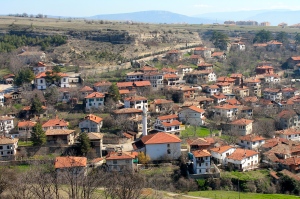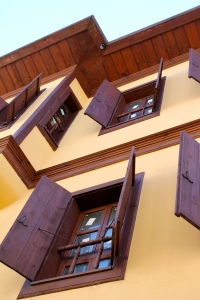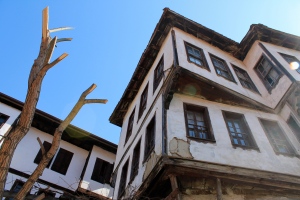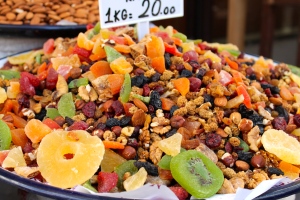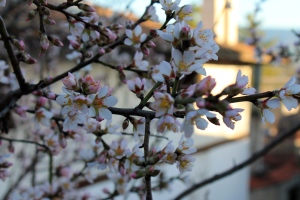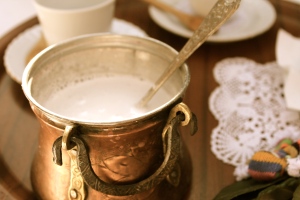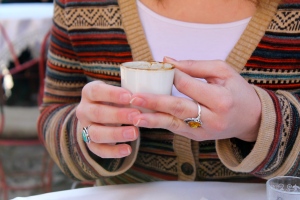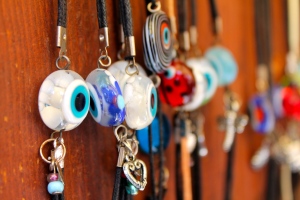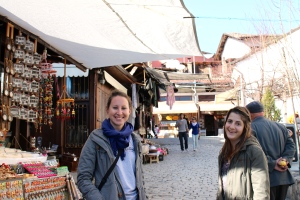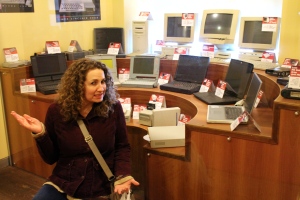This weekend, I met up with some friends in Karabük Province, the home of the lovely and hospitable L.O., to visit Safranbolu, a quaint restored Ottoman town and a UNESCO World Heritage Site. We had a fabulously relaxing weekend that I would like to share with y’all via a short Turkish lesson…
Var/yok
Var is one of the most versatile and commonly used words in the Turkish language. It literally means “there is/are…,” but it can also be used to mean “have/has,” “it exists,” and a whole host of other things in that vein. Var‘s opposite, yok, means “there isn’t/aren’t…,” etc.
Saturday was sunny and warm, so we decided to take a leisurely stroll from Safranbolu’s new town to the historic old town. The walk was long, but mostly downhill. A few minutes into our walk, however, we came across a set of stairs that looked like they led down to a path that would cut our walk in half. Naturally, we opted for this more adventurous, and shorter, path.
As we approached the bottom of the stairs, we heard a low growl. A large guard dog jumped up out of nowhere, gnashing his teeth and barking. We turned on our heels and fled back up the stairs, with M.P. bringing up the rear, calling out “Don’t run! Don’t run!” in an attempt to keep the group calm.
When we reached the top, huffing and puffing, R.O. gently shut the gate behind us, muttering “We’ll just close that because ‘Köpek var’ sign yok.”
Afiyet olsun
I’m not sure how I made it through my first foray in Turkey without learning afiyet olsun. It literally translates to “Let there be appetite!” but the closest sensical translation is “Enjoy your meal!” It is said before meals, after meals, when you see someone on their way to a meal, when you see someone eating, and when you see someone who may have recently eaten. In other words, you hear afiyet olsun a lot.
And we did a lot of eating in Safranbolu. After taking the long way around into town, we stopped at a beautiful cafe on a sunny, cobblestoned street corner for Türk kahvesi, sahlep (a warm and delicious drink made from orchid root), and coffee-grounds fortune-telling. Later, there was a late lunch of Safranbolu bükmesi, a spinach-and-cheese-filled pita wrap, followed by çay and hot chocolate over a game of tavla (backgammon). Because of our late lunch, we didn’t really want dinner, just dessert. We troopedover to a local sweet shop, where we stocked up on baklava, cookies, and these churro-like, honey-drenched pastries. When we arrived back at L.O.’s apartment, we snuggled on the couch and stuffed ourselves full of sugary goodness while watching “Bridesmaids.” Afiyet olsun, indeed.
Güle güle kullanın.
This is one of those phrases that doesn’t translate nicely into English because we just don’t use it. The closest approximation that I’ve ever heard is “Enjoy using it!” Güle güle kullanın is said to you after you buy something; the speaker is hoping you will enjoy your new purchase.
When we weren’t eating, we wandered the streets of Safranbolu, admiring the handiworks and crafts on display in the countless shops. I had no intention of buying anything, but then some beautiful leather purses caught my eye. The gnarled, old shopkeeper was friendly in the old-man way – he proceeded to explain to me how he made the purses and showed me the callouses on his hands and completely won me over. After a bit of back and forth, during which I insisted on a lower price and he insisted that leather was expensive and his craft was difficult, we agreed on a price. As he wrapped up my new bag, he wished me a hearty güle güle kullanın to which I responded…
Ellerinize sağlık
This one of those phrases that my tongue constantly trips over but that I love to say. It means “health to your hands” and is usually said to someone who has just created something with their hands, such as food. Or, in my case, a handmade leather purse. I must have wished my new shopkeeper/leatherworker friend ellerinize sağlık half a dozen times before running off to find my friends.
Until next time, dear readers, E.J. Hoca (Teacher) wishes you a hearty görüşürüz! See you later!

